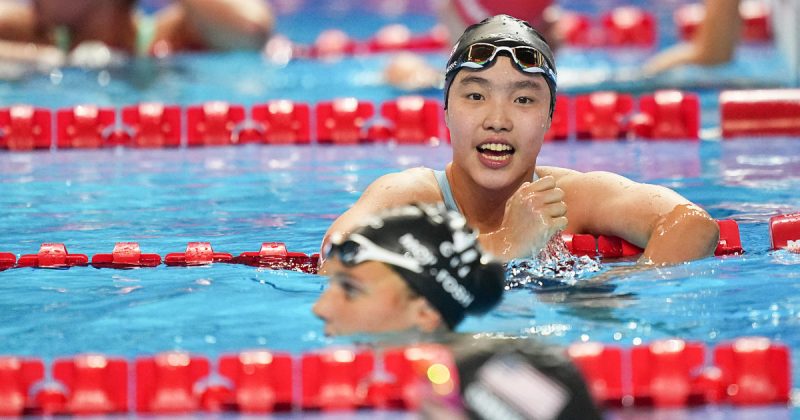
Twelve-year-old Yu Zidi from Hebei province, China, is making waves—literally. Her extraordinary swimming talent has propelled her onto the world stage, earning her a bronze medal at the World Aquatics Championships in Singapore. This makes her the youngest-ever medalist at the prestigious competition, a feat that’s garnered international attention and comparisons to swimming legends like Katie Ledecky and Summer McIntosh. Yu’s remarkable times, even surpassing McIntosh’s at the same age, have sparked excitement about her future potential.
However, amidst the global praise, a note of caution is emerging from within China. Concerns are rising about the potential for overhyping the young athlete and the pressure that comes with sudden fame. The state-backed Shanghai Observer urged a more restrained approach, advocating for allowing Yu to develop naturally without the burden of intense expectations and hero worship. This sentiment reflects a broader shift in China’s approach to promoting its elite athletes, moving away from the potentially detrimental effects of a ‘toxic’ fan culture.
This shift is significant given China’s long-standing focus on achieving success in international sporting events. The intense pressure to win gold medals, coupled with the scrutiny of a highly engaged and sometimes overwhelming fan base, has led to challenges for past athletes. The rise of organized sports fandom in China, coupled with instances of cyberbullying and even intrusions into athletes’ personal lives, has prompted government intervention, including the shutdown of numerous social media accounts promoting excessive fandom.
The experiences of other prominent Chinese athletes, such as Olympic champion swimmer Pan Zhanle, who disbanded his official fan group due to the overwhelming attention, highlight the need for a more balanced approach. Even Olympic gold medalist table tennis player Fan Zhendong spoke about the trauma of a stranger entering his hotel room and the severe mental stress caused by online abuse. These incidents underscore the potential pitfalls of unchecked fandom and the importance of protecting young athletes’ well-being.
The case of Yu Zidi presents a crucial opportunity for China to navigate the complexities of nurturing young talent while mitigating the potential negative impacts of intense public attention. Striking a balance between celebrating her achievements and ensuring her healthy development is crucial. The restrained tone adopted by some Chinese media outlets, as highlighted by Hong Kong graduate student Jessie Zhou, reflects a growing awareness of the need to prioritize Yu’s well-being and allow her to focus on her training. The coming years will be critical in determining how China manages the extraordinary potential of this young swimmer while safeguarding her future.
Ultimately, Yu Zidi’s story is not just about remarkable athletic talent; it’s a compelling case study in the delicate balance between fostering success and protecting the well-being of young athletes in the spotlight.










